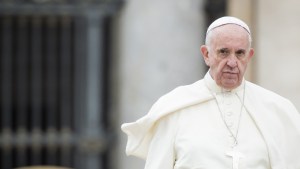Lenten Campaign 2025
This content is free of charge, as are all our articles.
Support us with a donation that is tax-deductible and enable us to continue to reach millions of readers.
“The problem of our world is not babies being born: It is selfishness, consumerism and individualism, which make people overfilled, lonely, and unhappy,” Pope Francis said during the fourth edition of the “General States of Natality,” a forum on birth rates. The Pope visited the event, held in Rome on May 10, 2024, urging young people not to feel defeated in light of the difficulties that the world faces today. He also called on Europe’s governments to tackle low birth rates directly.
“The question of birth rates is very close to my heart,” Pope Francis said. “The problem is not how many of us there are in the world, but what kind of world we are building […] it is not children, but selfishness, which creates injustice and structures of sin.”
For the fourth consecutive year, Pope Francis participated in the “General States of Natality,” a forum aimed at finding solutions to the demographic winter in Italy supported by the government and numerous companies. The average age in Italy is 47-years-old, and the fertility rate, which has been falling steadily in recent years and is one of the lowest in the world, was estimated in 2024 to be 1.26 children born per woman.
The event was held in the amphitheater in Via della Conciliazione, the road that leads to St. Peter’s Square, and the Pope was welcomed by almost 1,300 participants, many of whom were young people and children.
Italian Prime Minister Giorgia Meloni did not participate in this year’s event as she did in the 2023 edition.
Overpopulation theories “long outdated”
In his address the Pope criticized the selfish mentality focused on material goods that he sees as prevalent in today’s societies.
“At the root of pollution and world hunger are not children being born, but the choices of those who think only of themselves,” the Pope said. “The delirium of an unbridled, blind, and rampant materialism, of a consumerism that, like an evil virus, erodes at the root the existence of people and society.”
“Selfishness makes one deaf to the voice of God […] homes become filled with objects and emptied of children, becoming very sad places,” he continued. The Pontiff then added spontaneously, there is “no shortage of doggies and kitties” but there is a “shortage of children.”
“The number of births is the first indicator of a population’s hope. Without children and youth, a country loses its desire for the future,” the Pope underlined.
He criticized Malthusian theories that see hunger or pollution as the effects of “overpopulation.” The Pontiff noted these theories are now “long outdated,” and mentioned how they speak about “human beings as if they were dealing with problems,” when instead human life is always a “gift.”
“Every gift of a child, in fact, reminds us that God trusts in humanity […] Our ‘being here’ is not by chance: God wanted us, He has a great and unique plan for each of us, no one excluded,” he said.
To young people: “Let us row to reverse course”
In his speech the Pope also strongly encouraged young people to be courageous in the face of adversity. “I know that for many of you the future may seem ominous, and that between falling birth rates, wars, pandemics and climate change it is not easy to keep hope alive,” he acknowledged.
“But do not give up, have faith, because tomorrow is not something unavoidable: We build it together, and in this ‘together’ we first of all find the Lord. […] Let us not resign ourselves to a script already written by others, let us row to reverse course, even if it means going against the tide!” Francis encouraged.
He also asked young people to not forget about their grandparents and the elderly, saying that the fact that society “discards” them is a “cultural suicide.”
“The future of children and grandchildren is also built with the aching backs from years of toil and with the hidden sacrifices of parents and grandparents, in whose embrace is the silent and unobtrusive gift of a lifetime’s work,” the Pope explained.
Europe: from the Old Continent to the continent of the old
“’The Old Continent’ is increasingly turning” into a continent of old people, the Pope said. Europe is “tired and resigned” and “so busy exorcising loneliness and anguish that it no longer knows how to taste […] the true beauty of life.”
Francis expressed concern at the “new records” of low birth rates in Europe, and Italy in particular, deploring the fact shared with him that the two “most income-generating investments are the manufacturing of arms and contraceptives.”
“One destroys life, the other prevents life. And these are the investments that give the most income. What future is ahead of us? It is ugly,” he underlined. “Despite many words and much effort, it has not been possible to reverse course. How come? Why can’t this hemorrhaging of life be stopped?”
The Pontiff urged governments to “sow today so that children can reap tomorrow,” by implementing “serious and effective choices in favor of the family.” He highlighted in particular how mothers should not have to be “in the condition of having to choose between work and child care” or young couples having to face “job insecurity and the inability to buy a home.”
Read his full address here.




